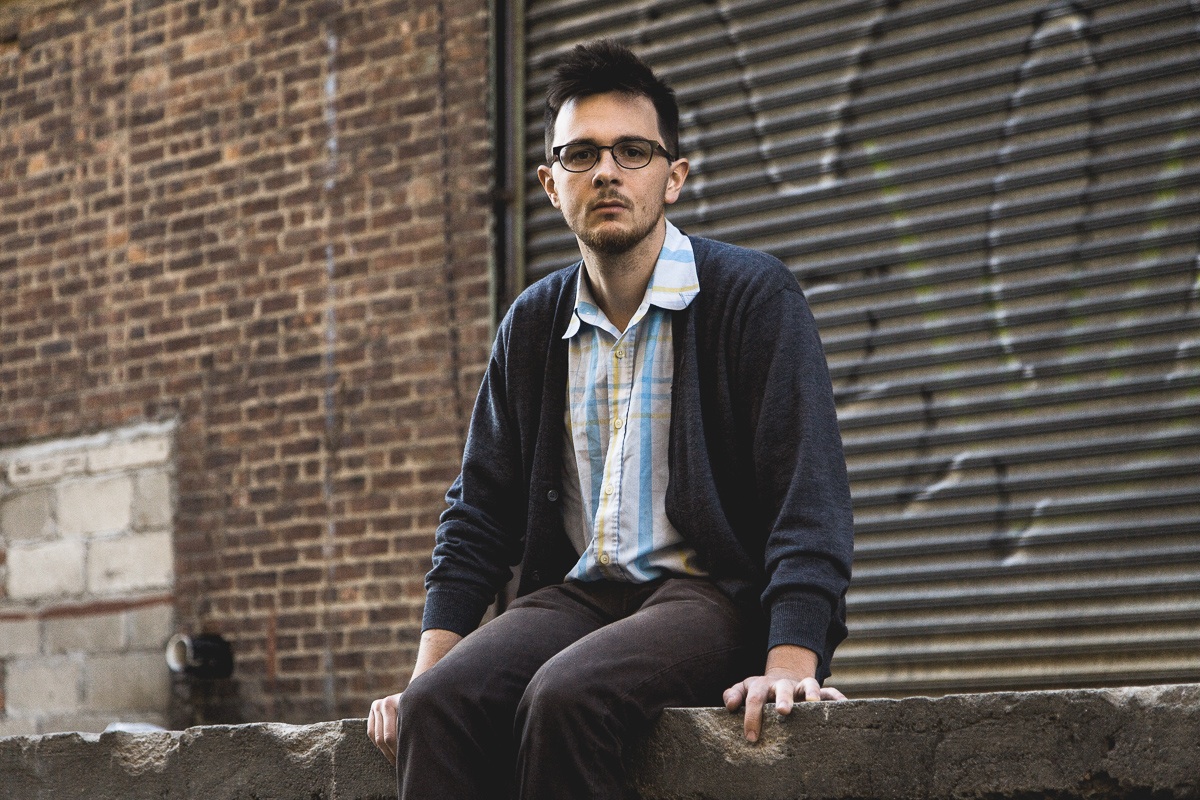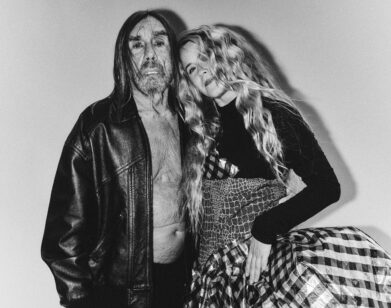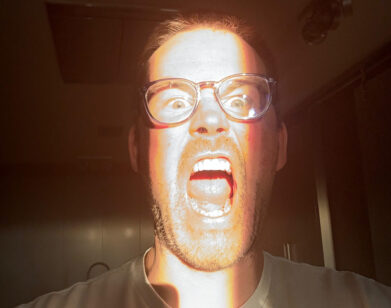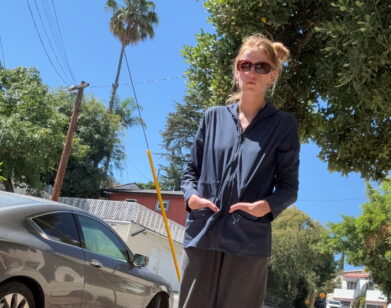Exclusive Song Premiere and Interview: ‘On Me,’ Andrew Cedermark

ABOVE: ANDREW CEDERMARK. PHOTO BY ERIK ERIKSON
We’re sitting in the northwest stretches of Central Park, somewhere between Morningside Heights and the Upper West Side, but our view of a lake and a lawn, which Andrew Cedermark accurately describes as “bucolic,” seems like it would make more sense near his former home in Charlottesville, VA.
Our interview is just a small part of a busy Saturday for Cedermark, who now lives in Manhattan. He has course work due on Monday for a graduate degree in education, and probably some press loose ends to tie up before the July release of his second record Home Life. Cedermark doesn’t exactly have time for a summer vacation, either. After his semester ends, he’ll tour in support of his record, returning to New York at the end of the summer in time to start another school year.

MATT PUTRINO: It seems like your albums have been anchored in geography. Early on you were in suburban New Jersey with Titus Andronicus, then Charlottesville, Virginia for your first solo record, and now for Home Life you’re in New York. Is it strange having your moving choices dissected?
ANDREW CEDERMARK: I suppose so. Being a longtime lover of the Microphones and Phil Elverum, I am really into the way in which people perceive music to an extent from being in a certain place. By way of that, I think that this new record is a very Charlottesville record. Though in many ways it is more specifically about moving back to New Jersey. I think that there are elements of it, and I think that it’s not false to think of it in that way, about moving. On one level it’s a narrative imposed upon it, and in other ways it is a deep truth to what the thing itself is.
PUTRINO: What brought you to Charlottesville?
CEDERMARK: I went to college there. Then I left after college and was on tour with Titus Andronicus. I stopped doing that and had this fantasy about what life in Charlottesville would be like, because it is a lovely town and it’s full of incredibly nice people. And when you go there, you get to live in a big old house—cockroach-infested, sure, but it costs very little to live in. [You can] live the dream of spending a lot of time outdoors and having a lot of things affordable and available to you as a young person. I was drawn back there for that, and having been on the road for a while, I felt really desperate for a sense of community. It’s basically a nice place to be for a couple of years.
The thing that’s special about it in particular, being a young person there, is that people who are in their 20s kind of run the town. My friend Jacob [Wolf] who plays bass in my band, was booking all the shows we’d go to, my friend ran the movie theater, all these people in positions of cultural power that you don’t have access to in a place like this. It’s a good warmup for being an actual adult, where you can’t do those things until you’re a little bit older.
PUTRINO: I read you’re not the biggest fan of touring.
CEDERMARK: I will be dipping my toe back into the water—what’s the best way to say that? We’ll be trying again this summer. We’ll be on tour in July. I certainly do have a basic lifestyle distaste for being on the road and eating bad food, and not sleeping, and drinking too much, and so on. But one of the problems with rock-‘n’-roll is that it hasn’t allowed for the domestic perspective that is more concerned with what it means to be a person trying to live your life in the world. If we were to conceive of indie rock as art, who knows if that’s the right thing to do, but I think it’s important to think about it in that way. That it’s not just people running away from things, or trying to escape things, or partying all of the time. I think there’s an underrepresented perspective that I would link to my distaste for touring. What I perceive to be my project as a musician, at least lyrically.
PUTRINO: Once you consider touring to be work, it’s interesting to think about time off the road as a way to help the writing process.
CEDERMARK: Of course it would be great to have a Rolling Stones-quality band. To have watched Titus over the years turn from the drunken ramshackle thing that I was a part of to this really tight and wonderful Rolling Stones-influenced act has been really inspiring, but that takes time and depends on you being on the road and working on your band as a unit. I guess that’s at odds with [a record] being this personal thing. It doesn’t seem like it should be a rule that the only art that is valid and worthwhile is made by a person who is only doing that.
I think one of the sort of fun, sort of sad things about being in your 20s, if you’re a person interested in making art or generally interested in the humanities, when you try to make money from it, life has this way of becoming a consolation prize that you get instead of this life that you envisioned yourself having. I think that in that way, the work-life balance cuts to the heart of some important stuff happening right now. Just because it’s so hard to make a living doing anything. On one level all you can do is what you want, because whatever you do you’re not going to make money anyway. On the other level, if you try to turn what you do into something that you make money off of, then it turns out feeling bad for you.
PUTRINO: You made this record at Marcata Studios in upstate New York. The studio is a barn, right?
CEDERMARK: Yeah. There’s this great guy named Kevin McMahon who runs this studio in New Paltz, NY. It’s a big barn, and he used to have a studio on 138th Street and Broadway, that was the original location of Marcata. It was The Walkmen‘s studio. They had an all-analog crazy deal there. My friends and I recorded there when we were teenagers, so there’s a long-lost album from those times. It’s probably available somewhere on the Internet. So he moved all that stuff up to New Paltz. He’s just a wonderful guy. He recorded the Titus album, the Real Estate album, and all other friends like Liquor Store, and Liam the Younger just finished a record up there too. It’s sort of nice. He knows all of my oldest friends.
PUTRINO: Before this record, how many experiences have you had working with a producer?
CEDERMARK: None. Never. Well, the only time I had ever done anything in a studio before, it had been with Kevin. I’ve probably recorded in a studio only three or four times, and having known him for so long and liking the way he makes all my friends’ music sound. He’s a big fan of talking things out, which I appreciate. He makes you think more deeply about what you’re trying to do, and forces you to make sure what you are doing is something you actually want to do. So yeah, he is, in addition to being a great producer, a great editor of music, thoughts, and intentions.
I’m curious to see the way the whole thing will go. The whole point of going to the studio and investing my own money in it was so that I didn’t have the excuse of feeling like I wasn’t trying. Which is one of the pitfalls of home recording, just fitting it in and not structuring your life around it in some way. It’s this forsaken thing you like to do.
PUTRINO: Did you plant roots in New Paltz?
CEDERMARK: We recorded when we could. We weren’t up there for more than three days at a time, it was just over weekends. It happened over the course of a year, so we didn’t really plant roots. We just went up for the weekend. I did it with two different bands so it was a revolving cast of people throughout the year. There’d be a lot of emailing back and forth with Kevin trying to get things right.
PUTRINO: Are you going to stick to one band for the tour?
CEDERMARK: Definitely. The New York configuration of this band has been together for almost a year. That’s Evan Brody, who runs the label Underwater Peoples and performs as Evan Only, and has a record coming out pretty soon. My friend Jacob who moved up with me from Charlottesville, and my friend [Alex] Tretiak, who’s a great old pal. The four of us have been playing together for some time, doing fairly conventional things—two guitars, bass, and drums—but trying our best to make people care.
PUTRINO: “On Me,” the track we’re premiering with this interview, has this devastating moment halfway through when the Bill Withers melody completely disintegrates into that droning movement. What was your thought process deconstructing such a calculated pop song?
CEDERMARK: The first song and the last song on the record are based on the same thing, or have the same melody and are based on the same chord structure. I was thinking about calling the record “Lean on Me” for a while, but we thought that might be a bad idea and that Bill Withers would like to sue us for that reason. The reason why I sang that song to that melody is because it seemed like it fit. There’s also some thematic relevance. As far as that tearing sound is concerned—this is not a great philosophical answer, but a practical answer—my first record had a lot of stuff like that, some more ambitious production elements. I thought it would be a nice way to give the records a sense of continuity, and to approach what I’m doing as a cohesive thing. Sometimes you just make a decision and you like it. Often something like that is just a limitation of the medium. You’re like, “Okay, I really want this to be intense, so I’m going to add a lot more stuff to it. Now it’s making this really horrible noise, maybe that’s the way it was supposed to be all along.”
PUTRINO: You’ve described your version as a rewriting instead of a cover. It’s obviously a much different song, but where do you see the difference between a cover and a rewriting?
CEDERMARK: In the most literal sense, the lyrics have been largely rewritten and made to be about another person in another time. It’s also a thematic rewrite, turning a song about coming together into one about wishing you could come together. I suppose a cover song involves some amount of interpretation, but on this record, there are a lot of places where I’m drawing from other things, and that was part of the process. Starting with another song, not knowing the kind of song I wanted to write, and figuring out that I wanted to write a song like song X, and rewriting it.
PUTRINO: What are the origins of the album cover?
CEDERMARK: My girlfriend and I lived in an apartment in a big old house in Charlottesville. It’s on this really tiny street called Marchant Street, and it’s called the Marchant Street House. The neighborhood down there is called Woolen Mills, and the Marchant Family used to run the wool mill that created Civil War uniforms, so there’s a lot of neat old history. And we were in this apartment that was way too big for us, in a house that was way too big, and there were a lot of cats around.
PUTRINO: Your cats or the neighbors’ cats?
CEDERMARK: Our cat, and the neighbors’. Everyone had cats. There were tombstones for all the cats who had fallen. So yeah, the short answer is that’s a picture I took of a place I used to live. But the guy who did the lettering and a small design on the back is Robert Beatty, who does album covers for a lot of cool people. I guess it’s not immediately recognizable as his work because I suggested a lot, but he did a really nice job putting everything together.
PUTRINO: Things like the typeface?
CEDERMARK: Yeah. There was a book of John Ashbery’s poetry with a cover I really like from a pure design level, and it looks exactly like that. The book is called Shadow Train; I haven’t read it, but I was looking around the library for ideas. As the name of the album changed and so on, we swapped out the photos.
PUTRINO: Well, it looks great.
CEDERMARK: I hope so. It’s hard to know if something looks good or professional if you did it. Because you perceive of yourself as an amateur, and you have done this thing, it’s inevitably going to look amateurish to you.
HOME LIFE WILL BE RELEASED BY UNDERWATER PEOPLES ON JULY 16. ANDREW CEDERMARK’S SUMMER TOUR STARTS JULY 11 AT BROOKLYN’S SHEA STADIUM.






